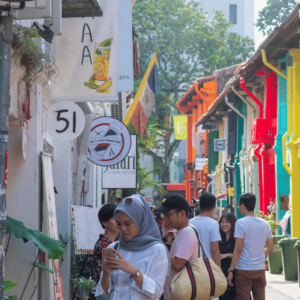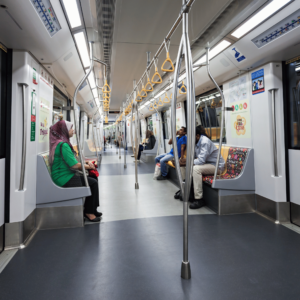Introduction – Singapore Budget Hacks: Money Saving Tips for Quality Living
Living in one of the world’s most expensive cities, Singaporeans constantly grapple with managing their finances. A 2019 study revealed that about half of the population struggles to save money regularly.
Dive into this comprehensive guide that presents powerful budget hacks designed to significantly cut expenses without compromising your quality of life in Singapore.
Are you ready to embark on a journey toward financial freedom and start saving more effectively? Let’s get started!
Key Takeaways
- Setting up a savings account is a fundamental part of budgeting in Singapore, helping individuals establish orderly monetary habits and accumulate funds for investments or unexpected expenses.
- Credit card perks like cashback rewards and exclusive promotions can help you save money while managing your expenses efficiently.
- Embracing pre-loved goods and bargain shopping in Singapore allows individuals to stretch their budgets and enjoy the city’s vibrant shopping scene without breaking the bank.
Setting gift limits with friends and family is an intelligent money-saving strategy that reduces unnecessary expenses while enjoying meaningful exchanges.

Basic Financial Planning in Singapore
In Singapore, basic financial planning involves setting up a savings account and using a piggy bank for small savings. It also includes setting reminders for bill payments and taking advantage of credit card perks while ensuring to pay off the credit card balance each month.
Setting up a savings account
Initiating a savings account forms the groundwork for prudent financial planning in Singapore. Not only does it provide a safe and secure place for your money, but it also helps you establish orderly monetary habits.
Automating payments directly to your savings account is one of the most effective and efficient methods for effortlessly saving money. This ensures that a portion of your earnings is consistently set aside without extra effort.
This strategy, widely used by savvy traders and investors, expedites saving by allowing them to accumulate funds more quickly. They designate these funds from their income before any expenses can chip away at them.
Adopting this systematic approach to saving can minimize impulsive spending and grant you greater control over your finances.
Additionally, this method bolsters your capital for future investments or unexpected expenses. According to fundamental financial wisdom, making regular deposits into your savings account is a quick and easy way to achieve long-term financial goals.
By putting your money into savings, you’ll save your money and pave the way for a more secure financial future.
Using a piggy bank for small savings
For people in Singapore, the humble piggy bank can be a surprisingly effective tool for enhancing savings strategies.
This time-honored method offers invaluable lessons about budget control and disciplined saving. You can gradually accumulate substantial savings by regularly depositing small amounts of money into your piggy bank – whether it’s a loose change or a portion of your daily expenditure.
This approach allows you to improve your savings without feeling financially burdened. So, if you’re looking for a simple yet effective way to save better, you may also want to consider the piggy bank method.
Anecdotal evidence among traders and investors highlights how such habitual saving improves financial status and cultivates peace of mind. It’s revealed that some adults continue to use piggy banks for their financial management, proving yet again there are no age limits for effective budget hacks in Singapore.
Incorporating this simple strategy into your lifestyle allows you to harness its benefits while navigating one of the most expensive cities.
Establishing Alerts for Timely Bill Settlements
Staying on top of your bill payments is a crucial aspect of financial management. Setting reminders for these payments can prevent late fees, maintain good credit scores, and increase peace of mind.
Traders and investors, especially those with diversified portfolios or multiple income streams in Singapore’s dynamic market, can leverage this simple yet effective strategy to manage their finances better.
Apps like DBS NAV Planner not only aid in tracking expenses but also send timely reminders for upcoming bills. Moreover, automated payment systems ensure that even if you’re caught up in the hustle-bustle of stock exchanges or investment meetings, your bills get paid on time.
Thus, establishing such habits could go a long way toward securing your financial future without causing undue stress or disrupting your current lifestyle.
Leveraging the Benefits and Advantages Offered by Credit Cards
Credit cards in Singapore offer a range of perks that can benefit traders and investors. Individuals can earn cashback or reward points on their purchases using credit cards for daily transactions.
This can ultimately help them save money or earn valuable rewards. Owning at least one credit card is highly recommended in Singapore, as it provides access to exclusive promotions and discounts.
Credit card spending is expected to continue rising in 2023, indicating the popularity of these cards among consumers. DBS, a prominent credit card provider in Singapore, offers various options suitable for different needs and lifestyles.
Clearing Your Credit Card Balance Monthly
One effective strategy to master thrifty living in Singapore is paying off your monthly credit card balance. This ensures that you avoid accruing high-interest charges and falling into debt.
The anticipated rise in credit card spending in Singapore for 2023 emphasizes the imperative nature of responsible card usage, especially considering the Average Annual Percentage Rate (APR) of Credit Cards in Singapore ranges between 15% and 28%. By meticulously tracking your expenses and committing to timely payments, you not only maintain commendable financial health but also optimize the myriad of perks and benefits associated with credit cards.
Additionally, tracking your monthly expenses through credit card bills can aid in better financial planning and help you allocate your monthly income properly according to the popular 50/30/20 rule used by savvy Singaporeans.

Family Deals and Memberships in Singapore
Get the best deals and save money as a family by taking advantage of family memberships for discounts and cashback.
Getting a family membership for discounts
One effective way to save money in Singapore is by getting a family membership with discounts and benefits. Family memberships are available for various establishments and attractions, allowing you to enjoy exclusive deals and perks.
For instance, enrolling in a family membership program like the IKEA family card can help save you a ton of money through special discounts and promos on furniture, home decor, and even food at IKEA restaurants.
Alternatively, purchasing a family membership at local clubs or recreational centers reduces the rates for swimming pools, gyms, or sports activities. By leveraging these family memberships, you can significantly cut costs while relishing quality time with your loved ones.
Getting cashback
Cashback is a smart way for traders and investors in Singapore to save money on everyday purchases. By using cashback apps or credit cards that offer cashback rewards, individuals can earn a percentage of their spending back as savings.
This means that every time you make a purchase, you’re putting money back into your pocket. With various cashback options in Singapore, including dining, shopping, and online platforms, it’s easy to find savings opportunities.
Whether buying groceries or shopping online, getting cashback is a simple yet effective budget hack that can help stretch your dollar further while enjoying the perks of being a savvy shopper.

Money-Saving Shopping Hacks in Singapore
In Singapore, making specific lifestyle changes and prioritizing daily expenses can form an effective saving plan. Incorporating bargain shopping and hunting for deals into this strategy can save you significant money.
Bargain shopping and hunting for deals
- Singapore offers numerous opportunities for bargain shopping and hunting for deals, allowing individuals to stretch their budgets while enjoying the city’s vibrant shopping scene.
- Popular destinations like Orchard Road and Bugis Street are known for their wide array of shops and markets, where visitors can find discounted items, factory outlets, and seasonal sales.
- To discover unique bargains and vintage treasures, you can also explore local flea markets and bazaars, such as Sungei Road Thieves Market.
- Online platforms like Lazada, Shopee, and Carousell provide a convenient way to browse and compare prices from various sellers, offering exclusive discounts and promotions for savvy shoppers.
- Keeping an eye out for warehouse sales and clearance events organized by retailers is another smart strategy to score great deals on electronics, fashion, home appliances, and more.
- Subscribing to newsletters or following favorite brands’ social media accounts can provide insider information about upcoming sales or special discounts.
- Taking advantage of loyalty programs offered by major retailers allows you to accumulate points that can be redeemed for future purchases or even enjoy members-only perks.
- Exploring thrift stores or second-hand shops in Singapore can be a treasure trove for budget-conscious you looking for stylish clothing options at a fraction of the original price.
These strategies will help individuals maximize their shopping experience in Singapore while staying within their budget. By being resourceful, proactive, and open-minded when finding deals, they can enjoy the best of Singapore’s shopping scene without breaking the bank.
Setting gift limits with friends and family
Setting gift limits with friends and family is a smart money-saving strategy that can significantly impact your budget. You can effectively reduce unnecessary expenses and save money by establishing boundaries on how much to spend or even limiting gift-giving to only children.
This approach is particularly helpful for individuals with a large extended family or social circle, where gift-giving can quickly become overwhelming and financially burdensome. Not only does this practice help you stay within your budget, but it also encourages others to adopt a more cost-conscious mindset when exchanging presents.
So consider having open conversations with your loved ones about setting gift limits and focusing on enjoying each other’s company rather than spending excessive money.
Taking time to think before making a purchase
One key budget hack in Singapore is to think before making a purchase. In a consumer-driven society, getting caught up in impulse buying and spending more than necessary is easy.
You can avoid unnecessary expenses by pausing and reflecting on whether you truly need an item or if it’s just a momentary desire. This practice helps save money, promotes mindful consumption, and prevents clutter from accumulating.
Research shows that implementing this simple habit can reduce impulsive purchases by 23%. So, next time you’re tempted to splurge, remember the importance of taking a moment to consider the long-term value of your purchase and how it aligns with your financial goals.
Embracing pre-loved goods
Instead of buying new, consider embracing pre-loved goods as an effective money-saving shopping hack in Singapore. You can significantly reduce expenses by choosing second-hand items without compromising quality or style.
Buying pre-loved goods allows you to save money and is also good for the environment by reducing waste and extending the lifespan of products. In Singapore, there are numerous platforms and marketplaces where you can find gently used items such as clothing, furniture, electronics, and more.
Whether it’s online marketplaces like Carousell or physical thrift stores, exploring the world of pre-loved goods opens up a new avenue for budget-friendly shopping while contributing to a greener planet.
Organizing a swap night
One effective money-saving strategy in Singapore is organizing a swap night, where individuals can exchange goods they no longer need. This helps reduce the cost of buying new items and promotes sustainability by giving old items a new lease on life.
By participating in a swap night, traders and investors can save money while acquiring items they may need for their business or personal use. It’s an excellent opportunity to declutter and find value in unwanted possessions, all while connecting with others who share similar interests.
In addition to saving money, organizing a swap night aligns with the growing trend towards conscious consumerism and reducing waste.

Saving Money on Water and Electricity in Singapore
To save money on water and electricity in Singapore, reduce water usage by taking shorter showers and being mindful of turning off taps when not in use.
Conserving water usage
Making the conscious decision to conserve water is an environmentally responsible act and a practical way to safeguard your hard-earned money. Given the escalating cost of living, every drop saved can significantly save your utility bills.
Here are some practical tips to reduce water consumption:
- Address Leaks Immediately: Considering that even the most minor leak can result in substantial water wastage over an extended period, it’s crucial to address them promptly.
- Install water-efficient fixtures: Invest in low-flow faucets, showerheads, and toilets designed to minimize water usage without compromising performance.
- Take shorter showers: Limit your shower time to conserve water. Consider using a timer or setting a personal goal to keep your showers brief.
- Collect and reuse rainwater: Install rain barrels or containers to collect rainwater runoff from your roof. Use this water for activities like watering plants or cleaning.
- Optimize dishwasher and washing machine use: Wait until you have a full load before running these appliances to maximize their efficiency and minimize water usage.
- Use a broom instead of a hose: When cleaning outdoor areas like patios or driveways, opt for sweeping with a broom instead of using water to wash away debris.
- Water plants wisely: Water your plants early or late in the evening when evaporation rates are lower. Aim for targeted watering instead of saturating the entire garden.
- Choose native plants: Selecting native plant species for your landscaping reduces the need for excessive watering since they are adapted to local climate conditions.
- Recycle greywater: Greywater refers to wastewater from activities like dishwashing or laundry that can be recycled for non-potable purposes such as flushing toilets or watering plants.
- Educate family members or housemates: Raise awareness about the importance of water conservation within your organization and encourage everyone to adopt water-saving practices at home.
Reducing AC usage
- Replace your old air conditioner with a more energy-efficient model to reduce electricity consumption and save money on your bills.
- Install ceiling or portable fans in your trading or investment space to circulate air and create a cool breeze, reducing the need for AC.
- Use programmable thermostats to regulate the temperature and minimize using the air conditioner when you’re not actively using the space.
- Keep windows and doors closed while running the AC to prevent cool air from escaping and hot air from entering.
- Use curtains or blinds to block direct sunlight, which can heat your trading or investment space and increase AC usage.
- Dress comfortably and avoid wearing heavy clothing indoors, making you feel hotter and increasing reliance on the AC.
- Opt for natural ventilation by opening windows during cooler times, such as early morning or evening, to let fresh air in without relying solely on the AC.
- Create cross ventilation by strategically placing fans near open windows to promote airflow throughout your trading or investment space.
- Regularly clean and maintain your air conditioner filters, coils, and vents to ensure optimal performance and energy efficiency.
- Consider investing in energy-saving devices like smart plugs or power strips that automatically turn off electronics when not in use, reducing overall energy consumption.
FACT: Using a fan instead of an air conditioner can save approximately $441 a year on electricity bills in Singapore. (source: Energy Saving Tips)
Being mindful of laundry habits
Being mindful of your laundry habits can lead to significant savings, contributing to financial resilience. For instance, washing a full load of laundry at once uses less energy and water than washing two half-loads. This practice reduces your environmental footprint and lowers water and electricity bills.
Over time, these savings can accumulate and cushion against unexpected expenses, enhancing financial stability.
Adopting such eco-friendly and cost-effective habits is part of a broader strategy of thrifty living. It requires individuals to be mindful of their daily activities and their impact on their finances and the environment.
By integrating money-saving strategies into various aspects of daily life, including laundry habits, you can master the art of frugal living. This approach benefits your wallet and contributes to a more sustainable world.

Money-Saving Tips on Food and Groceries in Singapore
Several tips for saving money on food and groceries in Singapore can help you stretch your budget.
Shopping local for fresher and cheaper produce
Shopping local for your product is not only a great way to support local farmers, but it can also help you save money. You can often find fresher and cheaper options than imported produce by purchasing fruits and vegetables that are in season and grown locally.
Plus, buying directly from farmers at local markets or participating in community-supported agriculture (CSA) programs allows you to bypass the middleman, which means lower prices. Additionally, shopping locally reduces the carbon footprint of transporting food long distances, making it an environmentally friendly choice.
So next time you need groceries, consider checking out your neighborhood farmer’s market or signing up for a CSA program to enjoy delicious and affordable produce while supporting sustainable farming practices.
Maximizing grocery purchases
- Take advantage of bulk buying options to save money on essential pantry items.
- Compare prices across different supermarkets and online platforms to find the best deals.
- Look for discounts and promotions on staple items like rice, pasta, canned goods, and cooking oils.
- Plan meals carefully and stick to a detailed shopping list to curb impulse buying and food waste.
- Buy seasonal fruits and vegetables, which are often cheaper and fresher.
- Consider purchasing generic or store-brand products instead of name brands to save money without compromising quality.
- Use loyalty reward programs supermarkets offer to earn points or cashback for future purchases.
- Take advantage of cashback apps or credit cards that offer rebates for grocery spending.
- Look for discounted or close-to-expiry date items for additional savings, especially for non-perishable products.
- Consider joining a wholesale club or cooperative to access lower prices on bulk groceries.
Buying in bulk
Buying in bulk is a smart strategy for traders and investors looking to save money in Singapore. You can enjoy significant cost savings over time by purchasing items in larger quantities.
Here’s why buying in bulk is a savvy move:
- Lower unit prices: Bulk purchases often have lower unit prices than individual items. This means you can get more value for your money and reduce your overall expenses.
- Discounts and promotions: Retailers frequently offer discounts and promotions on bulk purchases, allowing you to save even more. Watch for sales or special deals that allow you to stock up on essential items at reduced prices.
- Convenience and time-saving: Buying in bulk means you’ll have a larger supply of goods on hand, reducing the frequency of shopping trips and saving you valuable time. This convenience is especially beneficial for busy traders and investors who prefer to focus their efforts on other aspects of their financial activities.
- Reduced packaging waste: When you buy in bulk, you often avoid excessive packaging that comes with individually packaged items. This helps reduce environmental waste and saves costs associated with unnecessary packaging materials.
- Long shelf life products: Non-perishable products such as canned goods, dried food items, or household supplies are excellent options for buying in bulk as they have longer shelf lives. These staples can be stored safely for future use, ensuring that your investment doesn’t go to waste.
- Customizable quantities: Buying in bulk allows you to tailor the quantities according to your needs or preferences. Whether stocking up on essentials or purchasing a large quantity of a particular investment product, the flexibility gives you more control over your finances.
- Extra savings over time: The cumulative savings can be substantial when you consistently buy certain items in bulk. Taking advantage of these long-term savings can contribute positively to your financial goals as a trader or investor.
Meal planning
Meal planning is a cost-saving practice that benefits traders and investors in Singapore. By taking the time to plan meals, you can not only save money on food and groceries but also ensure that your nutrition needs are met.
Here are some key points regarding meal planning:
- Meal prepping helps control expenses: Taking the guesswork out of daily meals by planning and preparing them ahead of time can significantly reduce your overall food costs. You can stretch your budget further by shopping for ingredients in bulk and cooking larger portions.
- Control portion sizes and reduce food waste: By planning your meals, you have better control over portions, which can help prevent excess food waste. This is particularly important for traders and investors with erratic schedules or long work hours.
- Save on dining out: When you plan your meals; you are less likely to rely on expensive takeaways or dine-in options during busy workdays. Instead, you will have delicious and affordable homemade meals readily available.
- Optimize nutrition: Meal planning allows you to consider your nutritional needs more effectively. You can ensure that your meals balance essential nutrients, helping to support your overall well-being and energy levels as a trader or investor.
- Use resources such as cookbooks or online recipes: Numerous resources provide meal planning ideas tailored to Singapore’s dietary preferences and budgets. Utilize these resources to discover new recipes, cooking techniques, and ways to incorporate affordable ingredients into your meals.
- Consider batch cooking: Batch cooking involves preparing large quantities of a particular dish or ingredient that can be used for multiple meals throughout the week or easily stored for later use. This technique saves time and money while still providing delicious homemade options.
- Plan snacks as well: Besides main meals, it’s beneficial to plan snacks, too. You can avoid impulse purchases or expensive vending machine options by readily offering healthy, budget-friendly snacks.
- Take advantage of local produce: Singapore has bustling markets and fresh produce stalls. Incorporating locally sourced fruits, vegetables, and ingredients into your meal plans supports local businesses and can be more economical than imported options.
Scouting for the best deals across various stores
Comparing prices across different stores is a smart strategy that you can employ to maximize your grocery savings in Singapore.
| Steps | Description |
| Expand Shopping Options | Explore different stores instead of sticking to a single supermarket for better deals and discounts. |
| Use Price Comparison Apps | Apps provide a practical way to compare prices from different stores in Singapore, ensuring you get the best deal for each product on your list. |
| Take Advantage of Rewards and Discounts | Some apps and cards offer rewards and discounts on necessities like groceries, which can add to significant savings over time. |
| Learn from Online Resources | Online forums and resources such as Reddit are teeming with money-saving tips and strategies that can guide where to find the best deals in Singapore. |
| Evaluate Advertised Prices | Comparing the prices of foodstuff advertised across different supermarkets gives a sense of which store offers better deals, leading to more informed purchasing decisions. |
By employing these strategies, you can significantly reduce their monthly grocery bills, ensuring more money is allocated to your trading activities.

Saving Money on Transport in Singapore
Opt for public transportation instead of owning a car to save on transportation costs.
Opting for public transportation instead of a car
Choosing public transportation over owning a car can be a smart financial move for traders and investors in Singapore. Not only does it help save on transportation costs, but it also reduces the hassle of parking fees, maintenance expenses, and high petrol prices.
Singapore offers an efficient and extensive public transport system, including buses and the MRT (Mass Rapid Transit), which are well-connected to major business districts and residential areas.
By relying on public transportation, traders and investors can allocate their resources towards more important matters such as investments or trading strategies. The money saved from not having a car can be put towards building an emergency fund or boosting long-term savings for future investment opportunities.
Earning petrol points for discounts
One effective way to save money on transport in Singapore is to earn petrol points for discounts. By utilizing credit cards that offer incentives such as shopping vouchers, cashback, air miles, dining discounts, or cheaper options, you can maximize your savings on fuel costs and make the most of your car’s fuel efficiency.
Look for cards with the best petrol discounts to ensure you get the most value from every dollar spent at the pump. With these rewards programs, you can enjoy significant savings on your monthly transportation expenses while enjoying the convenience and flexibility of having a car in Singapore.
Don’t miss out on this simple yet effective way to reduce your transportation costs and put more money back into your pocket.
Sharing rides or carpooling
One effective way to save money on transportation expenses in Singapore is through sharing rides or carpooling. By splitting the cost of tolls, petrol, and parking fees with others, traders and investors can significantly reduce their daily commute expenses.
Carpooling saves money and has additional benefits, such as reducing stress and making driving more enjoyable. Moreover, it helps alleviate traffic congestion in Singapore, benefiting both the environment and commuters.
Embracing this cost-saving practice is a practical way for traders and investors to optimize their finances while contributing to a more sustainable future.

Saving Money on Fun and Wellness in Singapore
Enjoying a fun and wellness-filled life in Singapore doesn’t have to break the bank – discover how to prioritize your well-being while saving money. Read on for budget-friendly tips and tricks to help you find balance without sacrificing your financial goals.
Choosing local treatments and services
Regarding fun and wellness in Singapore, choosing local treatments and services can be an excellent way for traders and investors to save money. Opting for local spas, salons, or wellness centers instead of high-end international chains can help you enjoy similar experiences at a fraction of the cost.
Additionally, many local establishments offer promotions and discounts tailored to locals, further helping you stretch your dollar. By supporting local businesses, not only do you save money, but you also contribute to the growth and vibrancy of the local economy.
Furthermore, taking advantage of traditional healing practices such as Chinese acupuncture or Malay massages can provide unique therapeutic benefits while being more affordable than their Western counterparts.
With Singapore’s rich multicultural heritage, many options cater to various wellness needs. From herbal remedies to traditional spa techniques, exploring these locally sourced treatments can be both cost-effective and culturally enriching.
Opting for home-based or outdoor workouts
Exercising at home or outdoors in Singapore is a great way to stay fit and contribute to your thrifty lifestyle. Instead of splurging on expensive gym memberships or fitness classes, outdoor activities like skateboarding can provide a fun and challenging workout while saving you money.
Alternatively, exercising at home is a convenient and affordable option that eliminates the need for pricey equipment. Investing in essentials like resistance bands or dumbbells allows you to create a versatile home workout routine without breaking the bank.
Consistently incorporating exercise into your thrifty lifestyle improves your overall wellness and reduces the likelihood of costly healthcare expenses down the road. By prioritizing physical fitness through budget-friendly options, you can allocate your money towards other essential expenses or savings while maintaining a balanced and fulfilling lifestyle in Singapore.
Taking advantage of free outdoor activities
- Explore Singapore’s beautiful parks and gardens, such as the Gardens by the Bay or the Botanic Gardens, which offer free admission and are perfect for a relaxing day.
- Enjoy a stroll along the scenic Marina Bay waterfront promenade, where you can enjoy stunning city skyline views and catch the mesmerizing light show at night.
- Discover Singapore’s cultural heritage by visiting free attractions like Chinatown, Little India, and Kampong Glam, where you can immerse yourself in vibrant colors, delicious street food, and unique architecture.
- Head to one of Singapore’s many nature reserves, such as MacRitchie Reservoir or Bukit Timah Nature Reserve, for a refreshing hike surrounded by lush greenery and wildlife.
- Take advantage of the city’s extensive network of cycling paths and rent a bike for a fun-filled day exploring Singapore’s neighborhoods and scenic coastal areas.
- Cool off from the tropical heat at one of Singapore’s public beaches, like East Coast Park or Sentosa Island’s Palawan Beach, where you can enjoy sunbathing, picnicking, or even try your hand at water sports.
Enjoying public pools for a low cost
Singapore offers a variety of affordable options for individuals and families looking to have fun and engage in wellness activities without breaking the bank. Public pools in Singapore provide enjoyable experiences at entry rates that cost less than a hawker meal.
These family-friendly facilities are perfect for those seeking budget-friendly recreational activities. By opting to visit public pools, individuals can promote their physical well-being and contribute to financial resilience by saving money on expensive leisure pursuits.
Astralpool Singapore even offers tips on lowering pool running costs, making it even more affordable for individuals to enjoy these refreshing pool experiences while maintaining financial stability.
Utilizing free resources such as libraries and museums
Libraries and museums in Singapore offer many opportunities for traders and investors to utilize free resources while expanding their knowledge and understanding of various industries. Here are some ways you can benefit from these valuable assets:
- Access to informative books and publications: Libraries house many books on finance, investment strategies, market analysis, and industry-specific literature. Take advantage of this extensive resource to expand your knowledge base and gain insights from renowned authors and experts.
- Research facilities and databases: Many libraries provide access to online databases and research tools that can help you gather crucial information for investment decisions. From financial reports to market trends, these platforms offer valuable data that traders can use to make well-informed choices.
- Specialized seminars and workshops: Libraries often organize free seminars and workshops conducted by industry professionals. Attending these events allows traders to stay updated with the latest market trends, learn new strategies, and network with like-minded individuals.
- Historical archives at museums: Museums in Singapore showcase exhibits that shed light on the country’s economic development, global financial history, and other related subjects. Exploring these collections provides a deeper understanding of market dynamics and historical events that shaped the investment landscape.
- Networking opportunities: Libraries frequently host events where professionals from various fields come together to share ideas and experiences. Conversations with fellow traders or investors can lead to valuable connections, collaborations, or potential mentorship opportunities.
- Art exhibitions highlighting economic themes: Some museums feature art exhibitions that explore economic concepts through creative expressions. These exhibits provide a unique perspective on finance-related topics while nurturing creativity and critical thinking skills.
- Virtual resources for remote learning: Besides physical resources, many libraries offer digital platforms where traders can access e-books, audiobooks, online courses, webinars, and other educational materials remotely. This is particularly beneficial for those who prefer flexible learning options or cannot visit physical libraries.
Conclusion
In conclusion, mastering thrifty living in Singapore is achievable through effective money-saving strategies. Individuals can save significant money by implementing these budget hacks, such as setting up a savings account, utilizing credit card perks wisely, and embracing pre-loved goods.
From conserving water and electricity to maximizing grocery purchases and opting for public transportation, every aspect of daily life can be optimized to save money. With these tips and tricks, Singaporeans can enjoy a more financially secure future while enjoying all the city offers.












